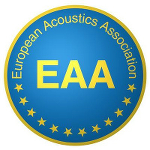Term of current Chairs: 2023-2026
Focus and research topics covered by the Technical Committee on Computational Acoustics
The TC-CA links researchers from computational acoustic modeling and numerical analysis and expects that the members are familiar with, or are in the learning stage, using advanced computer techniques for modern and classical acoustic problems. The group primarily consists of scientists developing numerical methods to solve classical acoustic problems. However, the group welcomes members interested in exploring original computational techniques for new acoustic applications. For example, numerical methods for nonlinear acoustic problems or updating recent results on new finite and boundary element methods for three-dimensional and two-dimensional linear acoustic scattering in both frequency and time domain. A major task of the committee is to stimulate joint activities and cooperation in these areas between researchers worldwide. The TC-CA will act as a virtual community for EU proposals where cross-fertilization between computation and scientific subjects is necessary to complete a viable EU proposal.
What are the goals of the Technical Committee on Computational Acoustics ?
An essential aspect of the TC on Computational Acoustics will provide a platform for exchanging information between scholars and students from a wide basis and different subject cohorts. Graduate student exchange will also form part of the program initiative. Researchers in acoustic computational science form the central group of the Technical Committee. This basis allows a connection between researchers worldwide in computational and numerical acoustics. The TC-CA will supply a webpage with links to educational materials helpful in studying and teaching activities and European-organized summer schools, e.g., Summer schools in numerical analysis, which would not otherwise be shown on an acoustics page. European host scientists will be able to advertise key visiting scientists to their laboratory with the location of appropriate seminars and other proposed visits by the key scientists.
Who will benefit from membership to the Technical Committee on Computational Acoustics ?
Membership in the TC-CA will benefit young researchers and graduate students, possibly in an exchange program where information exchange is essential. The intention is that students in interdisciplinary subjects will also benefit from the goals set for TC-CA, especially in receiving up-to-date, accurate subroutines and algorithms. Senior scientists will benefit from posting possible doctorate programs and keeping up-to-date with visiting scientists' locations, seminars, and expressions of interest in European-wide projects.
General Activities of the Technical Committee on Computational Acoustics
The general activities of the TC-CA, in the context of the EAA webpage, could include the following but is open to debate, discussion, and ongoing development:
- Benchmark Tests: A large variety of acoustic benchmark examples and benchmarking datasets for verification and validation can be found in this collection.
- Post new problems (not directly related to particular doctorate or Masters thesis projects, naturally).
- Links to conferences, where structured sessions in Computational Acoustics take place.
- Post Seminars by leading scientists and key visitors in university and research departments in Europe.
- Site for possible Ph.D. and Post Doc opportunities and MSc exchange programs in computational acoustics.
Contact
TC chair: Marcus Maeder (Marcus.Maeder@tum.de)
TC co-chair: Stefan Schoder (Stefan.Schoder@tugraz.at)
